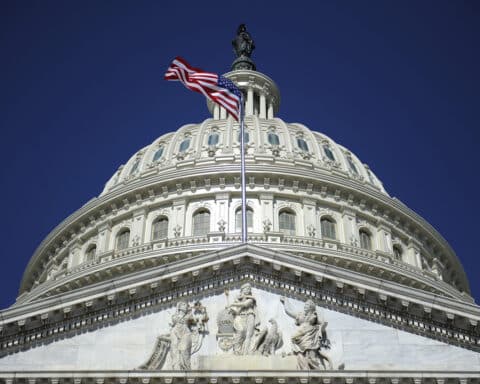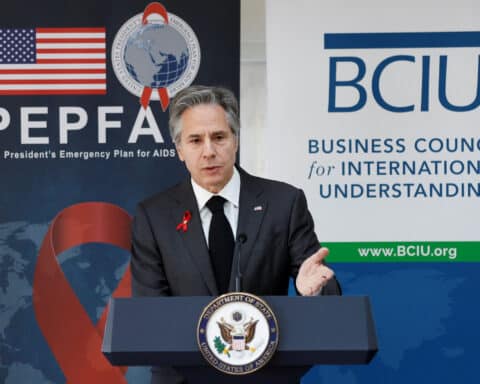In a recent letter to the U.S. Department of Justice, four congressional Republicans are calling on U.S. Attorney General William Barr to declare the prosecution of obscene pornography to be a top criminal justice priority.
They argue that the internet and other emerging technologies are fueling “an explosion of obscene pornography,” adding that it coincides with increased rates of violence toward women, human trafficking and child sexual exploitation.
“Fortunately, U.S. obscenity laws exist that, if enforced, can ameliorate this problem,” declares the letter, dated Dec. 6, which was signed by U.S. Representatives Mark Meadows of North Carolina, Jim Banks of Indiana, Vicky Hartzler of Missouri and Brian Babin of Texas.
Standards of obscenity
The representatives are correct in that obscene speech is not protected by the First Amendment, and that some of the more extreme, violent and disturbing forms of pornography might meet the legal definition of obscenity. But decades of court rulings pertaining to freedom of speech, shifting community standards and lingering memories of overzealous prosecutors have complicated the issue and dampened the political will to prosecute pornographers.
“One of the reasons why governments have pretty much given up on prosecuting violations of obscenity laws is that the legal definition of obscenity is vague and references the standards of local communities,” said Richard Garnett, a law professor at the University of Notre Dame.
Garnett told Our Sunday Visitor that since the internet has made available sexually explicit material from communities across the world, determining what is obscene according to one community’s standards is not as clear-cut as when the U.S. Supreme Court developed its obscenity-related precedents in the early 1970s.
“The court’s doctrines regarding pornography and obscenity were, obviously, crafted during a different time, when the cases had to do with magazines and movies, not webcams and online videos,” Garnett said.
Also, while the U.S. Supreme Court has ruled that obscenity may be prohibited, not all sexually explicit expression meets the legal definition of what is obscene.
“In other words, some of what most people would regard as pornographic is nevertheless protected by the First Amendment,” Garnett said. “In addition, even efforts to prevent minors from accessing sexually explicit material have to be carefully crafted, the court has said, so that they do not impose restrictions on adults’ First Amendment right to access such material.”
A public health issue
Aware of the existing First Amendment case law that protects sexually explicit material on free speech grounds, anti-porn advocates in recent years have sought to reframe pornography as a public health issue. They cite research that suggests pornography fuels the sexual exploitation and trafficking of children, promotes the sexual abuse of women and fosters an unhealthy view of sexuality, especially as children ages 11 and younger are increasingly being exposed to pornography. At least 13 state legislatures have declared pornography to be a public health crisis.
“Now we have peer-reviewed research and medical science that shows this content is a public health issue, particularly for young people whose brains are not fully developed,” said Donna Rice Hughes, president and CEO of Enough is Enough, a nonprofit that focuses on making the internet safer for children and families.
| PORNOGRAPHY: BY THE NUMBERS |
|---|
|
The letter from House Republicans cited an internet safety pledge, crafted by Enough is Enough, that President Donald Trump signed as a presidential candidate in August 2016. In signing the pledge, Trump vowed to appoint an attorney general who would enforce existing federal obscenity statutes to stop the explosion of obscene porngoraphy.
Hughes told Our Sunday Visitor that the pledge calls for the aggressive prosecution of obscenity statutes because the demand for extreme forms of hardcore pornography is fueling child pornography and human trafficking.
“We see many victims of trafficking depicted in this kind of content,” Hughes said. “An example of failed policy has been the past administrations that have tried to tackle human trafficking and child sex abuse without prosecuting the obscenity laws, which absolutely makes no sense.”
Difficult to prosecute
Since the 1970s, a deep reluctance has set in at the state and federal levels to investigate and prosecute adult, hardcore pornography, even the kind that depicts violent, deviant and disturbing content. In 2011, former U.S. Attorney General Eric Holder ended the Department of Justice’s Obscenity Prosecution Task Force, which President George W. Bush formed in 2005.
Some anti-porn advocates note that President Barack Obama’s administration did not initiate enforcement against adult-obscenity cases during his tenure, but Mary Graw Leary, a law professor at The Catholic University of America, told Our Sunday Visitor that the same pattern pertains to several past administrations.
“I think a mistake that is often made is to think that the failure to crack down on obscenity means that the feds don’t care, and I don’t think that’s the case,” said Leary, who argued that federal prosecutors tend to be hesitant to spend resources on prosecuting adult obscenity cases that are difficult to win.
“One of the reasons they are (difficult) to win is that we have a history of some rogue prosecutors going after what we would call literature today. It wasn’t always the best reputation to have to go after obscenity,” said Leary, who added that legally defining what is obscene has become increasingly difficult.
On the other hand, prosecuting a child pornography case is an easier decision.
“If I were a prosecutor and I have cases in front of me where actual children are being tormented, I’m going to prioritize that, because all I have to show is that the victim is a child engaged in sexually explicit conduct, and I can get a conviction,” Leary said.
A global scourge
Under Barr’s leadership, the U.S. Department of Justice has made several busts related to child pornography. In October, federal agents arrested more than 300 people in connection to an international child pornography investigation.
“The good news is that this administration has been very aggressive in tackling the sex-trafficking industry and the child sex abuse images that are running rampant online,” Hughes said.
Child pornography is a global scourge. A New York Times investigation in September indicated there were 18.4 million reports of child pornography on the Internet last year, which included 45 million photos and images of children being sexually abused.
“We are in the midst of a child obscenity crisis. There is so much child obscenity going on all over the internet everywhere,” said Leary, who believes that framing pornography as a public health crisis could be an effective strategy.
“I think it underscores the massive damage that child pornography is causing our society, and that the damage can’t just be attacked through the criminal law, just like drunk driving was attacked through also looking at it as a public health issue and a vehicle safety issue,” Leary said, adding that pornography today is not the “softcore” variety that older generations who grew up with Playboy Magazine may envision.
“If people were really aware of the level of misogyny and violence, and horror, they would want this stuff stopped,” Leary said. “Nowadays the pornography is so horrible that I do think there is real value in saying we can go forward on some of these cases, and that everybody would find that (pornography) violative of the law.”
Brian Fraga is a contributing editor for Our Sunday Visitor.





